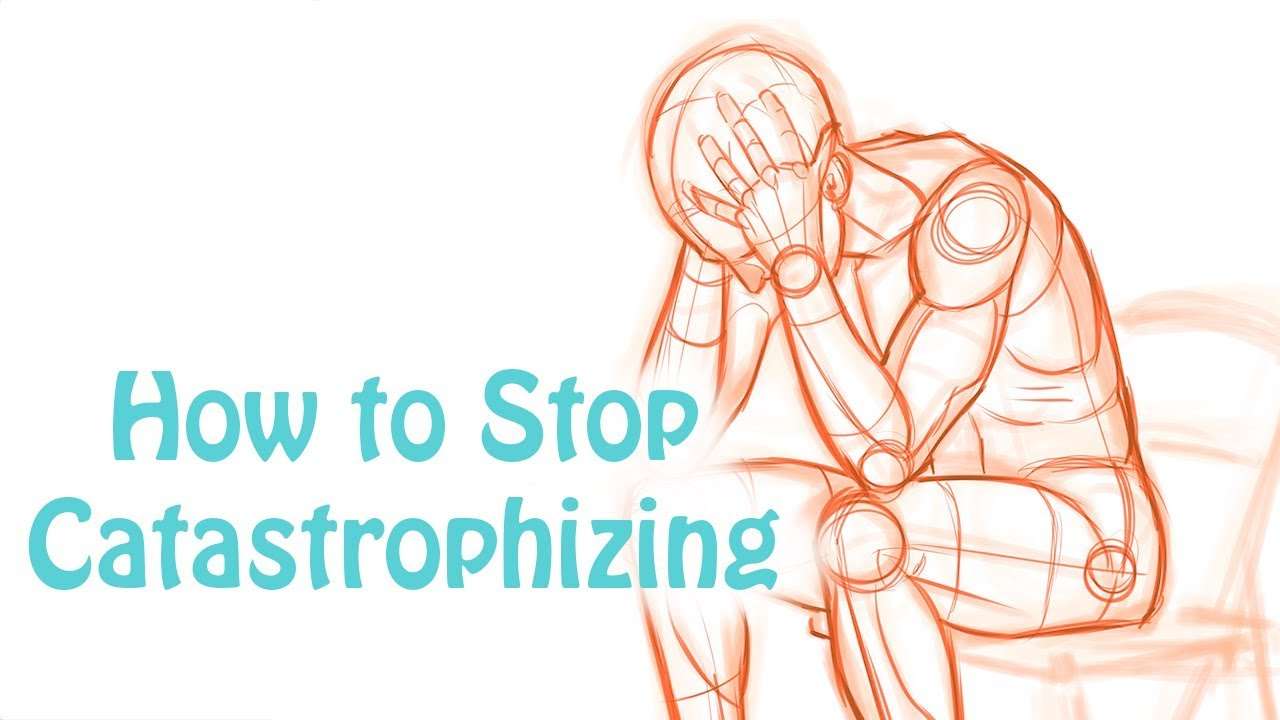Here’s the classic CBT approach to ending catastrophizing. Number one: just start by noticing when you are catastrophizing. What are the words you use? Are they things like never, terrible, fail, rejected, awkward, or anything else that’s an exaggeration, that makes things out to be worse than they are?
And then get better as well at noticing which situations you tend to catastrophize about, and write down what it looks like when you do it. Ask a family member or a friend to point it out to you.
So this is the first step in emotion processing. It’s observing, it’s getting better at noticing what’s going on with your thought patterns and your behaviors.
Then the second step in emotion processing is to pause. Just because you think something doesn’t mean it’s true. Just because you feel something doesn’t mean you have to believe it. So now is a great chance. Just slow it down and take a deep breath.
Number three is explore. Challenge those thoughts. Just because you think something doesn’t mean it’s true. Learn to notice and gently question your thoughts.
You don’t have to believe everything you think, but you also don’t need to beat yourself up for having these thoughts, like saying things like, “What’s the matter with me? Why do I always think this way?” That’s also not very helpful.
So instead, get better at noticing your thoughts and letting them pass through. This is another skill from acceptance and commitment therapy. It’s called cognitive defusion, and you can practice it with activities like Leaves on the Stream or the skills I teach in my video How to Stop Intrusive Thoughts and Overthinking. So I’ll link those below.
Number four is choose.Replace those thoughts with something more honest and more helpful.
Once you start to notice this type of thinking, you pause and you explore it. You can bravely pick up your emotional sword, and you can begin to combat this kind of thinking with more honest and more rational thoughts, thoughts that line up more with who you want to be and your values.
Some of the ways I like to do this are to think things like this: “Okay, even if something bad did happen, I can learn from it. It’s not the end of the world,” etc.
Here’s a couple more examples. Say someone says something like, “Oh no, I am such an idiot. I already made a mistake on this report; I’m never gonna finish it. Or if I do, it’s gonna be so flawed that it won’t matter. I’m gonna get fired no matter what.”
Okay. Wait. Pause. That’s not true. Let’s explore some alternatives here. “Everybody makes mistakes. I’m only human. I’ll fix this mistake, and if I need to ask for help I can. But I’m just gonna keep working hard and try to be more careful in the future.” Or you could say something like, “Nobody’s gonna fire me for a mistake or two in a report.”
See how we’re replacing the catastrophizing thoughts with thoughts that are a little bit more helpful?
Here’s another example: someone says something like, “I can’t believe I said that to my boyfriend. He’s gonna leave me for sure this time.” Let’s replace that with, “I shouldn’t have said that to my boyfriend. I really need to learn how to talk kindly when I’m upset. I’m gonna apologize and try to make it right. Hopefully he’ll understand and accept my apology and we’ll both learn something from this.”
So this approach to challenging catastrophizing requires us to stay engaged even when there’s a risk of things not going perfectly. And this is called vulnerability, the potential for success and also for getting hurt. But the only alternative is to guarantee failure by cutting yourself off before you even try.
So I’m a big fan of acceptance and commitment therapy. It’s a process which basically trains you to get better at feeling, to open yourself up to the emotions that come with living the life you value — love, joy, sadness, worry, hope, excitement, anxiety.
As you come to wholeheartedly embrace life and your goals and your values, you’ll get better and better at living with some risk, and you’ll be rewarded with lots of good things happening to you all the time.
May good things come to you as you courageously face life and the risks, joys, loves that come with it.
For those of you who are long-time followers, you may have noticed that this post is a remake of one of my old ones, and that’s because that post had a couple things that needed to be improved. So I hope you don’t mind me making a better version of my post on catastrophizing. So thank you all for reading. Take care.
Check out my course, Change Your Brain, below for more tips on improving your mental health.
Get the course: Change Your Brain-Neuroplasticity and Mental Health https://courses.therapyinanutshell.com/change-your-brain
In this video, we’re going to talk about catastrophizing- expecting the worst! Catastrophizing is an excellent way to make yourself anxious and depressed and completely ruin your life! Oh yeah, and I’m going to teach you 3 things you can do to stop catastrophizing. What is Catastrophizing: Catastrophizing is a common cognitive distortion, or thinking error. It’s when we think of a current or future situation as a catastrophe. So for example, you worry that you’re going to fail a test. Then you imagine what would happen when you do fail- you’re going to get kicked out of school, end up working a dead end job, fail at life at life and die homeless on the street. And all this because of a test at school. Catastrophizing is imagining the worst. It’s taking a difficult situation and interpreting it as being horrible, terrible, and unrecoverable. We’ve all known that person who, if they got a “B” on a test wailed “I’m failing Math class”. Many of us have had that parent who, when we didn’t want to do our chores they said something like “If you don’t do your chores, your college roommates will hate you and no one will want to marry you.” Like in the story about the jack, Catastrophizing often starts with a genuine setback, like getting a flat tire in the middle of nowhere, but then the thinking error turns that reality into the belief that something horrible is bound to happen- “I’m going to get shot, attacked and robbed!”. At its root, catastrophizing is about our habitual response to challenges or shortcomings. So take a second, pause this video and ask yourself: How do you think about failure? When these habits become part of a repeated pattern, they lead to depression or anxiety- and people tend to imagine never being able to recover. Catastrophizing is a thinking error (aka cognitive distortion) that makes you anxious, depressed, and unmotivated.
Looking for affordable online counseling? My sponsor, BetterHelp, connects you to a licensed professional from the comfort of your own home. Try it now for 10% off: https://betterhelp.com/therapyinanutshell
Learn more in one of my in-depth mental health courses: https://courses.therapyinanutshell.com/
Support my mission on Patreon: https://www.patreon.com/therapyinanutshell
Sign up for my newsletter: https://www.therapynutshell.com?utm_medium=YTDescription&utm_source=YouTube
Check out my favorite self-help books: https://kit.co/TherapyinaNutshell/best-self-help-books
Therapy in a Nutshell, LLC, and the information provided by Emma McAdam are solely intended for informational and entertainment purposes and are not a substitute for advice, diagnosis, or treatment regarding medical or mental health conditions. Although Emma McAdam is a licensed marriage and family therapist, the views expressed on this site or any related content should not be taken for medical or psychiatric advice. Always consult your physician before making any decisions related to your physical or mental health. About Me: I’m Emma McAdam. I’m a licensed Marriage and Family Therapist, and I have worked in various settings of change and growth since 2004. My experience includes juvenile corrections, adventure therapy programs, wilderness therapy programs, an eating disorder treatment center, a residential treatment center, and I currently work in an outpatient therapy clinic. In therapy I use a combination of Acceptance and Commitment Therapy, Systems Theory, positive psychology, and a bio-psycho-social approach to treating mental illness and other challenges we all face in life. The ideas from my videos are frequently adapted from multiple sources. Many of them come from Acceptance and Commitment Therapy, especially the work of Steven Hayes, Jason Luoma, and Russ Harris. The sections on stress and the mind-body connection derive from the work of Step
Catastrophizing is a common cognitive distortion that makes us anxious, depressed and unmotivated. It’s basically expecting the worst. When we expect the worst, we invite those things into our lives.
In this video I teach you how to recognize catastrophizing and 3 steps from CBT (cognitive Behavioral Therapy) to replacing those negative thoughts with something more helpful.
When we stop expecting the worst through catastrophizing, we can live a happier, healthier, more vibrant life.
Sign up for my Newsletter: www.therapynutshell.com
Change your Brain: Mental Health and Neuroplasticity Course: https://www.udemy.com/course/change-your-brain/?referralCode=49D58F6A4DDAB470C05C
Coping Skills and Self-Care for Mental Health Course: https://www.udemy.com/course/coping-skills-and-self-care-for-mental-health/?referralCode=B581946ECDF88EAE776D
How to Help: Practical Skills to help Loved ones with Mental Illness: https://www.udemy.com/course/how-to-help-depression-and-anxiety/?referralCode=9BE508815586D307F4A2
My Favorite Books for Mental Health:
The Anatomy of Peace: https://amzn.to/372uqco
Anxiety/Depression: Get out of your Mind and Into Your Life: https://amzn.to/2udkG0s
Trauma- Healing Trauma: https://amzn.to/2u9VZlk
Marriage- The 7 Principles for Making Marriage Work: https://amzn.to/3auVPWy
Anxiety/Depression-Get out of your mind and into your life for Teens: https://amzn.to/2Tws3dT
Social Anxiety- Painfully Shy: https://amzn.to/2NA5P6M
The Worry Solution: https://amzn.to/2R21wDE
A Calm Brain: https://amzn.to/2G13Swa
source



